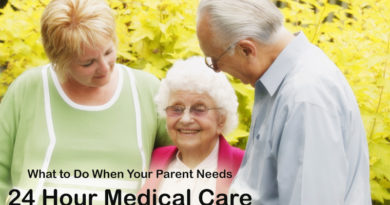How Specialized Nurses are Improving Healthcare for Older People
There are many different kinds of professionals who work with elderly patients, but two of the most common are family nurse practitioners (FNPs) and adult gerontology nurse practitioners (AGNPs). Together, these professionals are responsible for a wide range of elderly care. FNPs, for example, provide generic health screenings, while AGNPs provide the more specialized care that healthcare experts focusing on one specific age group can provide. This article looks at how these two groups of nurse practitioners are advancing care for elderly patients.

FNP vs AGACNP – some key differences
Before we look at some of the ways care providers are preparing for an influx of older patients and are improving the care they receive, let’s talk about some of the different types of care providers. There are quite a few distinctions between family nurse practitioners (FNPs) and adult gerontology nurse practitioners (AGNPs). If you’re interested in studying to become a nurse practitioner but aren’t sure which specialization is the right choice, let us explain some FNP vs AGACNP (which is a type of adult gerontology nurse practitioner) differences.
In general, the most striking difference is the groups of patients they care for as healthcare providers. While both types of nurse practitioners care for older patients, only AGNPs and AGACNPs focus specifically on elderly care. FNPs, on the other hand, are responsible for caring for patients of all ages, from infants to geriatric patients. When you decide you’re ready to move forward with your plans of becoming a nurse practitioner, remember that you can always reach out to well-respected academic institutions for more information. Rockhurst University, for example, has a long history of producing successful AGACNPs; you can learn more about their program on their website, and read more about the differences between FNPs and AGACNPs here.
Let’s look at how today’s nurse practitioners are preparing the healthcare system for an influx of elderly patients and what they are doing to improve patient care.
Care plans
One of the most important elements of healthcare, including care for the aging population, is developing effective care plans. Family nurse practitioners and adult gerontology nurse practitioners alike must be adept at crafting, adapting, and adhering to an appropriate care plan that takes all of the patient’s healthcare needs into consideration. This is more important for elderly patients than other age groups, as elderly patients tend to have both a rapidly increasing number of health issues and very diverse health concerns that require the input of professionals from many different health departments. Some patients might need the help of occupational therapists, for example, or adult gerontology nurse practitioners specializing in stroke recovery, as well as nutritionists and physical therapists to keep their strength and mobility in good condition.
Care plans ensure that all of a patient’s health needs are clearly outlined and shared with everyone involved in their care. This kind of comprehensive collaboration is crucial in gerontology care. Nurse practitioners – whether they are specialized AGNPs or more general FNPs – are often responsible for updating and, if necessary, revising care plans for their patients.
Health screenings
According to the Office of Disease Prevention and Health Promotion, the risk for many chronic health issues, including heart disease, arthritis, dementia and type two diabetes, increases with age. As a result, frequent health screenings are required to ensure that potential health concerns are discovered as soon as possible. The earlier these problems are identified, the more effective treatment will be for the patient. Both adult gerontology nurse practitioners and family nurse practitioners play a big role in carrying out health screenings, interpreting results, discussing them with patients and their loved ones, and crafting a care plan designed to provide the patient with optimal care.
Sometimes, FNPs and AGNPs need a more specialized opinion on a health issue. In these instances, they reach out to experts in the field in question and bring them into their patient care team. Part of being an excellent care provider is knowing when to reach out for a second opinion when screening results are inconclusive.
Preventative health care
In the past, the medical industry was primarily focused on responding to existing health issues and limiting the long-term damage they could inflict. Over the past few decades, that has changed quite a bit. Instead of responding to health conditions as they develop, today’s care providers are more focused on preventing serious health problems altogether. This includes limiting risk factors for potentially serious injuries, illnesses and conditions. FNPs are at the forefront of the preventative health movement and are often responsible for providing their patients with lifelong education about their health at all ages.
AGNPs are also responsible for preventative healthcare in a slightly different way. Caring for elderly adults often involves treating age-related health problems. It is not possible to prevent some of these issues. The risk of cancer increases with age, for example. So, while AGNPs can certainly manage risk factors as best they can, it is impossible to render a patient immune from the disease. Instead, they focus on preventing as many long-term health impacts as possible. They do this by using frequent health screenings in order to catch problems and provide treatment while they are still treatable.
Care for chronic conditions
Older patients are more likely to develop chronic health conditions than younger patients. The Centers for Disease Control and Prevention indicate that older patients are at a much higher risk of experiencing multiple chronic conditions at one time. Comorbidity also makes maintaining good health more difficult as time goes on. Conflicting health conditions make it more difficult to develop effective and purely beneficial care plans, which means that treatment efficacy is sometimes reduced in patients who have multiple health issues at the same time.
FNPs and AGNPs work to quickly identify and manage chronic conditions in their patients and are responsible for the long-term management of these health issues. Their focus is on building a supportive and elderly-friendly care environment that anticipates their patients’ needs and promotes open communication and good health.
If you’re interested in becoming a nurse practitioner to help the aging population in the United States, we hope we’ve helped you better understand some of your choices!



